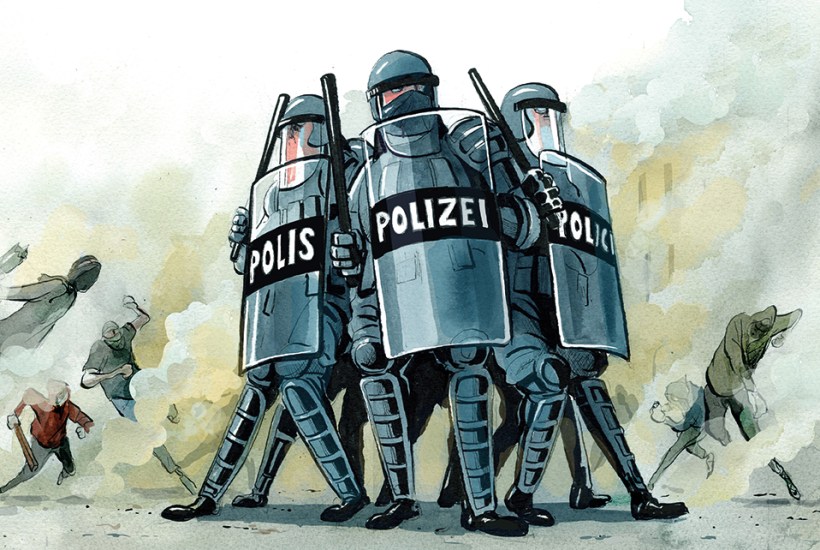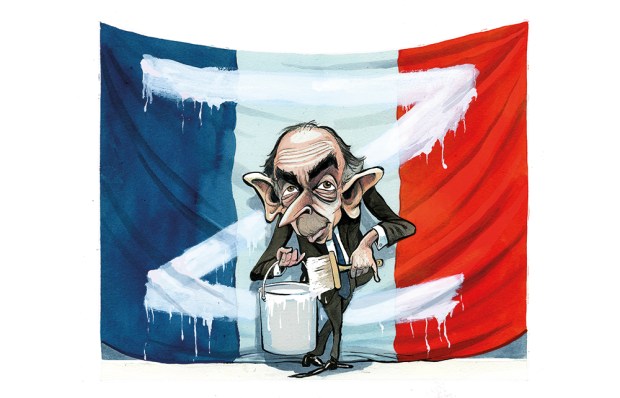Montpellier
A spectre is haunting Europe. In France, Sweden, Germany, Belgium and even Switzerland, the rule of law is being challenged by the rule of gangs. Disaffected young people cut off from society feel nothing but nihilistic contempt for it. Higher temperatures and social media are creating a heated summer. Judging from recent events in Paris and Stockholm, this year could be the worst so far.
The rise of gang violence is associated with immigration. Europe has shown itself incapable or unwilling to control the influx of migrants, some of them genuine asylum seekers, others simply opportunists. Nor have European politicians succeeded in dealing with the problems created by immigration, despite spending billions on social projects. A European summit on immigration in Brussels last week ended without even a joint declaration. Emmanuel Macron was unable to attend. He was preoccupied with riots across France, following the fatal police shooting of Nahel Merzouk, a 17-year-old boy, in suburban Paris.
The European Commission, deaf to the concerns of voters, has responded to the de facto collapse of the EU’s frontiers by demanding that countries such as Poland, which has largely closed its borders to refugees and is not troubled by the problem of migrant gangs, be fined €20,000 for each person refused.
France gets plenty of attention, but its street violence is hardly singular. Sweden, once a quintessential example of an open-minded society that welcomed immigrants, has become one of the most violent countries in Europe, as measured by gangland shootings. It’s a rare night in Stockholm that passes without some violent event. Police estimate that there are now more than 50 gangs, many in heavily immigrant communities. The Swedish newspapers read more like film scripts, with feuding gangs loyal to ‘the Kurdish Fox’ and ‘the Greek’ and violence connected to vendettas.
Police have identified 31,000 people in Sweden who have some connection to gangs. ‘We have never faced such ruthless criminality,’ said Anders Thornberg, national police chief, in a recent interview. Sweden’s laws go easy on the under-21s: a model, he says, that is an open invitation to gangland violence. ‘The model of organisation for the entire Swedish justice system is not rigged to face such extensive criminality.’
Take one court case this year: a teenage asylum seeker found work as a hitman, killed the wrong person, then went on the run. This being Sweden, his citizenship application was approved as he dodged the authorities. He was caught but sentenced to just four years in a prison – or something that passes for prison. As a teenager, he qualified for internet access, a single room, and security so lax that inmates can arrange external dental appointments. He used one to break free within a few weeks of his sentencing.
In the most recent waves of immigration, Sweden has let in more refugees and people claiming to be refugees, as a share of population, than any other European country. It is coping with the consequences. Last year Norway had four fatal shootings, compared with 63 in Sweden. In Botkyrka, south-west of Stockholm, a generation has been lost to gangs, says Paulina Neuding, a journalist who is writing a book on Sweden’s descent. Many of Botkyrka’s children, who are disproportionately from immigrant backgrounds, are easy pickings for gangs.
But Sweden is not alone. In Brussels last week, police and angry immigrants clashed. Belgian police said they arrested 64 people. Perhaps more surprising is the experience of Switzerland, not a country associated with rioting. In Lausanne, there were clashes last week between police and youths. Young people threw paving stones and at least one Molotov cocktail at officers. Swiss police detained Portuguese, Somali, Bosnian, Swiss, Georgian and Serbian citizens.
In Germany, where Angela Merkel opened the doors to refugees from the Middle East, the number of criminal offences across that country’s 16 federal states has skyrocketed, up by 12 per cent last year, with authorities recording some 5.6 million crimes. Incidents of rapes, sexual offences and fatal assaults all rose by more than 20 per cent last year. Robberies jumped 27 per cent.
In France, things are so bad that a night with no riots now makes the news. When the violence dies down, the aftermath looks ugly: this time we saw the looting of Jewish-owned businesses and the defacement of a Holocaust memorial. Plus ça change. Cars are burned, police assaulted and shops pillaged every day in France. In January, an Algerian man stabbed six people at the Gare du Nord, and last month a Syrian asylum seeker ran amok with a knife in an Annecy playground, wounding four babies and two adults. Macron has promised ‘no taboo’ when it comes to restoring order and has told social networks to censor content. Censorship is a weapon normally employed by totalitarian regimes, but Macron has a point.
So far, no politician in Sweden or France has offered a plausible solution to this problem, certainly not Marine Le Pen, the right-wing nationalist who is favourite to win the 2027 presidential election. Anger with the situation in Sweden saw the populist Sweden Democrats made part of a governing coalition, but they seem just as bereft of ideas.
Little wonder that anti-migration parties are doing well across Europe. The nationalist Freedom party in Austria, Giorgia Meloni’s Brothers of Italy and Germany’s Alternative für Deutschland, which last month won a district election for the first time, are all advancing. The Spanish Partido Popular is currently eight points ahead of the ruling socialists in the run-up to next month’s general election.
Common to all European countries where gangs are seizing control is the near collapse of the education system in immigrant areas. A British friend who teaches English in an inner-city high school in the southern city of Béziers tells me that one of her students, a gang member, was recently arrested for a serious assault. Her principal has advised her not to discipline her students lest she be assaulted herself. Some Swedish teachers report being told by pupils ‘Jag kan brösta en fyra’ or ‘I can take four’. The reference is to the number of years in prison that a Swedish teenager can expect for killing a teacher.
It’s the European way to see crime as an expression of social injustice. Jean-Luc Mélenchon, the leftist politician, has refused to condemn the rioters and instead attacked the police, describing recent events as an insurrection against inequality and racism. Nonsense, says a French journalist friend who has been covering the riots. ‘They couldn’t care less about the death of Nahel. This is nihilism. Nahel is just their excuse.’
It would be easy to put all the blame on Europe’s current leaders. But it’s not entirely their fault that so many unemployable young people, many born to immigrant parents, have lost loyalty to their countries. Sweden’s gang warfare may have worsened since the 2016 wave of migration, but many of those now arrested are Swedish born and bred (the ‘Kurdish Fox’, for example, is from Uppsala, born to Kurdish parents).
Integration failures are coming to a head. The crisis across Europe is the result of decades of wishful thinking about how migration-related problems will resolve themselves. But Britain would be unwise to revel in the misery of Sweden and France: social disorder is contagious. The recent French riots seamlessly crossed the border to Brussels, with its own population of angry young men. It might only take only a spark to plunge Britain into an inferno of its own.
Got something to add? Join the discussion and comment below.
Get 10 issues for just $10
Subscribe to The Spectator Australia today for the next 10 magazine issues, plus full online access, for just $10.
You might disagree with half of it, but you’ll enjoy reading all of it. Try your first month for free, then just $2 a week for the remainder of your first year.














Comments
Don't miss out
Join the conversation with other Spectator Australia readers. Subscribe to leave a comment.
SUBSCRIBEAlready a subscriber? Log in